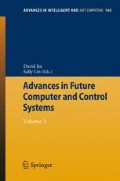Abstract
Based on current Web collaborative annotation systems, the paper first analyzes the common features of tags in documents as well as context-awareness to extend the concept of tags and make mapping between ontology, then uses ontology reasoning to enrich the semantics of tags, to capture implied semantic information, and to find out the relationships between documents, it finally detects pseudo-relevance among different documents in order to improve the accuracy of knowledge retrieval and knowledge recommendation as well as the flow of knowledge among subjects.
Access this chapter
Tax calculation will be finalised at checkout
Purchases are for personal use only
Preview
Unable to display preview. Download preview PDF.
References
Wu, F.: Semantics Enrichment in Collaborative Annotation Systems. Intelligence Magzine 29, 186–188 (2010)
Jing, T., Zuo, W.L., Gui, S.J.: Semantic Annotation in Chinese Web Pages: From Sub-clauses to RDF Representations. Computer Research and Development 45, 1221–1231 (2008)
Alani, H., Kim, S., Millard, D.: Automatic Ontology-based Knowledge Extraction From Web Documents. Intelligent Systems 18, 14–21 (2003)
Dill, S., Tomlin, J.: SemTag and Seeke: Bootstrapping the Semantic Web via Automated Semantic Annotation. In: 12th International Conference on World Wide Web. ACM, New York (2003)
Gao, S.L., Shia, H.J.: Research on Ontology Reasoning in Semantic Web. Journal of Huahai Institute of Technology 19, 28–32 (2010)
Wwoogle[DB] (September 09, 2009), http://swoogle.umbc.edu
Ehrig, M., Staab, S.: QOM – Quick Ontology Mapping. In: McIlraith, S.A., Plexousakis, D., van Harmelen, F. (eds.) ISWC 2004. LNCS, vol. 3298, pp. 683–697. Springer, Heidelberg (2004)
Zhang, Y.T., Chen, J.J., Xiang, J.: Research on SWRL-based Ontology Reasoning. Micro Computers Information 26, 182–184 (2010)
Author information
Authors and Affiliations
Corresponding author
Editor information
Editors and Affiliations
Rights and permissions
Copyright information
© 2012 Springer-Verlag GmbH Berlin Heidelberg
About this paper
Cite this paper
Zhu, X., Lin, B., Zhou, Y. (2012). Research on Collaborative Annotation in Semantic Web Environment Based on Ontology Reasoning. In: Jin, D., Lin, S. (eds) Advances in Future Computer and Control Systems. Advances in Intelligent and Soft Computing, vol 160. Springer, Berlin, Heidelberg. https://doi.org/10.1007/978-3-642-29390-0_2
Download citation
DOI: https://doi.org/10.1007/978-3-642-29390-0_2
Publisher Name: Springer, Berlin, Heidelberg
Print ISBN: 978-3-642-29389-4
Online ISBN: 978-3-642-29390-0
eBook Packages: EngineeringEngineering (R0)

